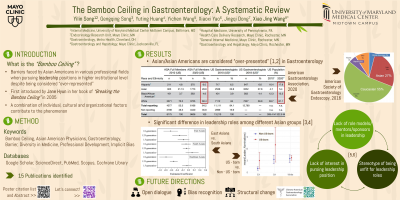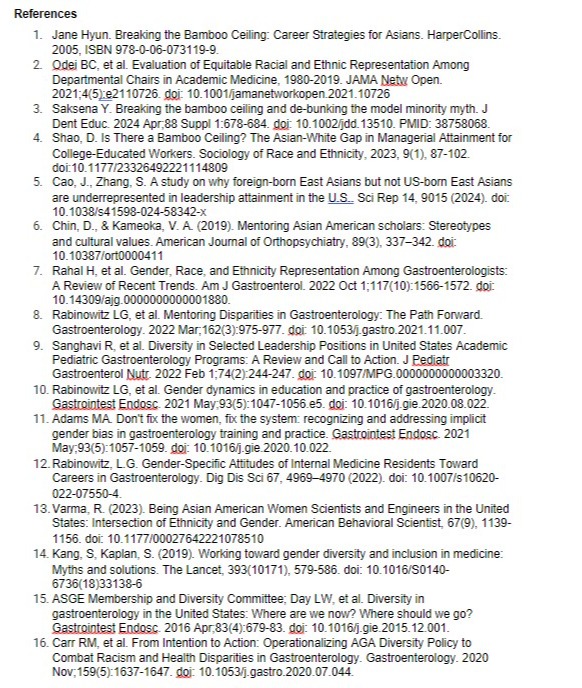Tuesday Poster Session
Category: Practice Management
P4902 - The Bamboo Ceiling in Gastroenterology Field: A Systematic Review
Tuesday, October 29, 2024
10:30 AM - 4:00 PM ET
Location: Exhibit Hall E

Has Audio

Yilin Song, MD
University of Maryland Medical Center
Baltimore, MD
Presenting Author(s)
Yilin Song, MD1, Gengqing Song, MD2, Yuting Huang, MBBS, PhD3, Yichen Wang, MD4, Xiaoxi Yao, PhD5, Jingqi Dong, 5, Xiao Jing (Iris) Wang, MD5
1University of Maryland Medical Center, Baltimore, MD; 2MetroHealth, Cleveland, OH; 3Mayo Clinic, Jacksonville, FL; 4University of Pennsylvania, Philadelphia, PA; 5Mayo Clinic, Rochester, MN
Introduction: The term "bamboo ceiling" refers to the barriers faced by Asian Americans in various professional fields when pursuing leadership positions in higher institutional levels despite being considered “over-represented” in medicine. The concept was first introduced by Jane Hyun where she proposed a combination of individual, cultural and organizational factors contributing to the phenomenon (1). This literature review explores the presence and impact of the bamboo ceiling in gastroenterology.
Methods: A search utilizing individual and combinations of keywords “bamboo ceiling”, “Asian American physicians”, “gastroenterology”, “professional development”, “barrier”, “implicit bias” and “diversity in medicine” was carried out among databases of PubMed, Google Scholar, Cochrane Library, ScienceDirect and Scopus. A total of 15 publications were identified.
Results: The existence of bamboo ceiling was demonstrated in academic leadership positions. An analysis from 1980 to 2019 revealed that while the percentage of Asian medical school departmental chairs increased from 1.4 to 10.1%, it was not representative of the 20.5% Asian faculty members. In contrast, white members made up 63.3% of faculty members and 78.1% of departmental chairs in 2019 (2). Female Asian Americans face greater obstacles than their male or non-Asian counterparts for leadership roles (3). In addition, East and Southeast Asians have significantly lower odds of holding managerial positions compared to South Asians (4), especially foreign-born East Asians (5). This underrepresentation in leadership then leads to barriers to the professional growth of trainees and junior faculty (6). East and Southeast Asians are underrepresented in leadership roles among both adults and pediatric Gastroenterology fields (8,9) despite being considered “over-represented” in medicine. The promoted structural changes addressing gender diversity in Gastroenterology are applicable to ethnic disparities (10-14). Suggested interventions include creating open dialogue opportunities and training gastroenterologists for bias recognition (11,15,16).
Discussion: This review demonstrates the existence of a “Bamboo Ceiling” in medicine, specifically in gastroenterology. Addressing these barriers requires a concerted individual, institutional, and national society effort. Our team will continue to explore the potential causes of Bamboo Ceiling and evaluate the organization effectiveness in promoting medical career development.

Note: The table for this abstract can be viewed in the ePoster Gallery section of the ACG 2024 ePoster Site or in The American Journal of Gastroenterology's abstract supplement issue, both of which will be available starting October 27, 2024.
Disclosures:
Yilin Song, MD1, Gengqing Song, MD2, Yuting Huang, MBBS, PhD3, Yichen Wang, MD4, Xiaoxi Yao, PhD5, Jingqi Dong, 5, Xiao Jing (Iris) Wang, MD5. P4902 - The Bamboo Ceiling in Gastroenterology Field: A Systematic Review, ACG 2024 Annual Scientific Meeting Abstracts. Philadelphia, PA: American College of Gastroenterology.
1University of Maryland Medical Center, Baltimore, MD; 2MetroHealth, Cleveland, OH; 3Mayo Clinic, Jacksonville, FL; 4University of Pennsylvania, Philadelphia, PA; 5Mayo Clinic, Rochester, MN
Introduction: The term "bamboo ceiling" refers to the barriers faced by Asian Americans in various professional fields when pursuing leadership positions in higher institutional levels despite being considered “over-represented” in medicine. The concept was first introduced by Jane Hyun where she proposed a combination of individual, cultural and organizational factors contributing to the phenomenon (1). This literature review explores the presence and impact of the bamboo ceiling in gastroenterology.
Methods: A search utilizing individual and combinations of keywords “bamboo ceiling”, “Asian American physicians”, “gastroenterology”, “professional development”, “barrier”, “implicit bias” and “diversity in medicine” was carried out among databases of PubMed, Google Scholar, Cochrane Library, ScienceDirect and Scopus. A total of 15 publications were identified.
Results: The existence of bamboo ceiling was demonstrated in academic leadership positions. An analysis from 1980 to 2019 revealed that while the percentage of Asian medical school departmental chairs increased from 1.4 to 10.1%, it was not representative of the 20.5% Asian faculty members. In contrast, white members made up 63.3% of faculty members and 78.1% of departmental chairs in 2019 (2). Female Asian Americans face greater obstacles than their male or non-Asian counterparts for leadership roles (3). In addition, East and Southeast Asians have significantly lower odds of holding managerial positions compared to South Asians (4), especially foreign-born East Asians (5). This underrepresentation in leadership then leads to barriers to the professional growth of trainees and junior faculty (6). East and Southeast Asians are underrepresented in leadership roles among both adults and pediatric Gastroenterology fields (8,9) despite being considered “over-represented” in medicine. The promoted structural changes addressing gender diversity in Gastroenterology are applicable to ethnic disparities (10-14). Suggested interventions include creating open dialogue opportunities and training gastroenterologists for bias recognition (11,15,16).
Discussion: This review demonstrates the existence of a “Bamboo Ceiling” in medicine, specifically in gastroenterology. Addressing these barriers requires a concerted individual, institutional, and national society effort. Our team will continue to explore the potential causes of Bamboo Ceiling and evaluate the organization effectiveness in promoting medical career development.

Figure: Reference list
Note: The table for this abstract can be viewed in the ePoster Gallery section of the ACG 2024 ePoster Site or in The American Journal of Gastroenterology's abstract supplement issue, both of which will be available starting October 27, 2024.
Disclosures:
Yilin Song indicated no relevant financial relationships.
Gengqing Song indicated no relevant financial relationships.
Yuting Huang indicated no relevant financial relationships.
Yichen Wang indicated no relevant financial relationships.
Xiaoxi Yao indicated no relevant financial relationships.
Jingqi Dong indicated no relevant financial relationships.
Xiao Jing (Iris) Wang indicated no relevant financial relationships.
Yilin Song, MD1, Gengqing Song, MD2, Yuting Huang, MBBS, PhD3, Yichen Wang, MD4, Xiaoxi Yao, PhD5, Jingqi Dong, 5, Xiao Jing (Iris) Wang, MD5. P4902 - The Bamboo Ceiling in Gastroenterology Field: A Systematic Review, ACG 2024 Annual Scientific Meeting Abstracts. Philadelphia, PA: American College of Gastroenterology.
